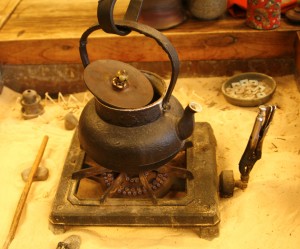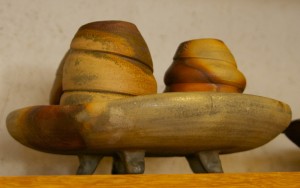I had come to Collegeville for a writing workshop, Writing to Change the World. But when I found out there was a ceramic artist in residence, with a giant wood kiln, I knew I had to carve out time in the week to visit the clay studio. It was after lunch on the last day that I wandered in and found that sacred moment.

An irori—a traditional Japanese sunken hearth. Photo courtesy of https://jadorechampagne.wordpress.com.
The master potter was away, but his apprentice greeted me and a few other guests with an invitation to tea. We sat around an irori, a traditional Japanese sunken hearth. The apprentice lit incense and hung the teapot above a single gas burner in the center of the sand. He explained that one of his jobs in becoming a potter was learning to make and serve a good cup of tea. I marveled at the wood-fired tea bowl in my hand, how ashes and flame kissed its surface to make it glow, how the firing made it crack to reveal beauty in a broken vessel—a beauty that Japanese aesthetics manifests in the way it honors the asymmetry and imperfection that keep us humble and make us real.
Sipping green tea and delighting in the magnificent pieces that had emerged from the most recent firing of the 87-foot wood kiln, I remembered the streaks of clay in my hair and wood smoke on my clothes that marked my college years. I fell in love with pottery my senior year in high school. In college I majored in art so that I could have as much studio time as I could get. Ceramics kept my hands dirty and busy with physical work, when my mind was tempted to wander in every direction. The studio gave me a place to belong and the opportunity to develop a centering discipline.
Just as making tea helped the apprentice become a better potter, making pots helped me to become the woman I am today, who now chooses words as her primary medium.
My ceramics professor used to say, “If every world leader took time to center a lump of clay each day, there would be no more war.” Even when I was in college, I had no intention of becoming a professional potter, but that work with clay taught me about transformation. Just as making tea helped the apprentice become a better potter, making pots helped me to become the woman I am today, who now chooses words as her primary medium. Learning to throw pots helped me in my work with words.
My freshman year I read M.C. Richards’ book, Centering: In Pottery, Poetry and the Person and knew that what I wanted most was to be whole, and to enter into a process so fully that both I and the world around me would be transformed. She wrote, “Poets are not the only poets. And poetry, if it is as deep a matter as I think it is, does not live in a house of words alone.” I did not fully understand all that she wrote, nor do I claim to now, but I accepted the invitation to live into work as a spiritual, centering discipline. My favorite poem of hers in that book consists of only two words:
Hands
birds.
The space between those two words offers a vision of freedom and transformation, creative power and delicate life. And so I opened my hands and prayed that they would be tools for liberation.
Words don’t stick in my hair and smear on my jeans, but they can still feel as messy as clay.
Words don’t stick in my hair and smear on my jeans, but they can still feel as messy as clay. A well-thrown pot should not be overworked; if it is, the clay starts to get wet and floppy. With a little time, a wheel-thrown piece gets firmer, and then you can trim a nice foot, add a handle, or brush on a slip design to bring out the beauty of the piece. Words can also lose their meaning with overwork. I’m learning to just let them flow, and then come back later to trim and embellish. Clay left too long can become dry and brittle. Words are not as time sensitive as clay. But, if I leave an idea for too long it loses its freshness and it is hard to get back in to it or build on it. My professor would often remind me that you don’t make good work by thinking about it; you make good work by doing it. It feels like an act of faith to take a deep breath and press out words on the keyboard, just as I would sit at the wheel to make a vessel, and hope those words will hold water.

Tea bowls. Photo courtesy of https://jadorechampagne.wordpress.com.
Sitting in the clay studio last summer, sipping the tea and admiring the work around me, I realized that I felt no urge to sit at a wheel and let the slippery wet clay yield beneath my hands. I remembered that joy, holding my breath, learning just how firm and yielding I needed to be, and realized it was time to get back to my writing workshop. I thanked my host kindly for the tea and conversation, and returned to my group exactly on time. One of the participants asked me if I had taken a nap—perhaps I had that blissed-out dreamy look on my face. I felt refreshed and thankful, reminded that I wanted to bring the lessons of clay to my writing.
I am thankful for those ceramic interludes, in my life and in my week at Collegeville, that remind me that good work starts with being centered and drinking a good cup of tea.
Like this post? Subscribe to have new posts sent to you by email the same day they are posted.



Leave a Reply